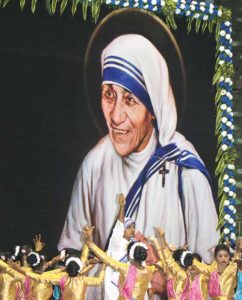 Mother Teresa gave herself to the lowliest of humanity; receiving the church’s highest honor.
Mother Teresa gave herself to the lowliest of humanity; receiving the church’s highest honor.
Newly-canonized St. Teresa of Kolkata is the latest and newest example of extraordinary women who distinguished themselves in religion and spirituality from Biblical times to the 21st century.

Young women from Missionaries of Charity homes in Kolkata, India, dance near an image of St. Teresa of Kolkata during an Oct. 2 celebration in her honor at the Netaji Indoor Stadium. Pope Francis canonized her Sept. 4 at the Vatican. (CNS photo/Anto Akkara)
Reflecting on their efforts and contributions not only to the church but to history and society, I wonder, where would we be without them? And why haven’t women received greater recognition and equality in the church?
There are innumerable examples of women’s contributions, biblically and historically:
Consider:
• Three books of the Bible attributed to women.
• Influential women in the Old Testament.
• Holy women in the New Testament.
• All the women-saints who preceded St. Teresa of Kolkata.
• Women who founded religious communities.
• Women who influenced our lives.
Specifically, books of the Bible are attributed to Judith, Ruth and Esther. What makes them shine?
Judith – the story of victory of the chosen people over its enemies. Judith is a young widow residing in a tiny Jewish nation, facing annihilation from a mighty Assyrian army. She overcomes cowardice of her own people, rebukes male leadership for lack of faith in God, and through prayerful intervention she slays the Assyrian general.
Ruth – her faithfulness demonstrated how trust in God is rewarded and how God’s goodness is unlimited. The widow of Boaz, a wealthy man who lived in Bethlehem, Ruth refused to leave her mother-in-law Naomi; subsequently she married a relative of Boaz. They had a son, Obed, who became the grandfather of King David. Also, Ruth is included in the genealogy of Jesus (Mt 1:1-16).
Esther – likened to Judith, her heroic efforts spared the Jewish nation. Threatened with extermination by Aman, a hostile enemy, the Jews were saved by Esther, who became their queen.
Among influential women in the Old Testament were:
Anna – wife of Tobit, a prophetess who recognized the infant Jesus as the Messiah.
Deborah – a prophetess who led Israel to victory over the Canaanites.
Hannah – she prayed for a son and God gave her Samuel. She dedicated him to God and he lived in the temple and became a prophet and judge.
Miriam – sister of Moses and Aaron. She led Israelites in praising God in dance and song after Moses parted the Red Sea.
Sarah – fist matriarch of Israel, wife of Abraham and mother of Isaac. God promised her, that though she had been barren throughout her life, she would give birth to a son in old age.
Rebekah (Rebecca) – matriarch, wife of Isaac and mother of Jacob.
Leah and Rachel – also matriarchs – and sisters.
Women of the New Testament:
Mary – mother of Jesus.
Elizabeth – cousin of Mary and mother of John the Baptist.
Mary Magdalene – freed from demons by Jesus, she was present at the cross and came to the tomb on Easter morning.
Martha and Mary – sisters of Lazarus, whom Jesus raised from the dead. Mary washed Jesus’ feet with expensive perfume.
Lydia – a Jewish convert and dealer in purple who gave apostles hospitality in her home. She was the first in Philippi to be baptized by Paul.
Joanna – among women whose contributions helped support Jesus and among those who discovered the empty tomb.
Susanna – with many others provided support for Jesus and apostles out of their resources.
Well-known saints whom Mother Teresa joined in sainthood are:
Elizabeth Ann Seton – first American-born saint and foundress of the American parochial school system.
Frances Xavier Cabrini – Italian-born, she was first American citizen elevated to sainthood, dedicating her efforts to Italian immigrants.
Joan of Arc – at 17, led a small French army that helped King Charles VII succeed in a fight against English. Burned at the stake at 19 for being a heretic, she was later exonerated of her so-called “crimes.”
Monica – her persistent prayer for wayward son Augustine was rewarded with his conversion by St. Ambrose. Becoming one of the church’s greatest teachers and philosophers, he joined his mother in sainthood.
Catherine of Siena – consecrating her virginity to God in early childhood, she became a Dominican nun whose exhortations resulted in conversions of thousands.
Rose of Lima – admired for her great beauty, in early childhood she dedicated her life to God. She modeled her life of extreme penance and mortification after St. Catherine of Siena.
Teresa of Avila – an ordinary woman who rose to greatness as teacher and writer. She founded the religious community of Discalced Carmelites.
And, let’s not forget all women who preserved and endured great hardship to found religious communities that are too numerous to mention.
How about the women influenced our lives?
Mothers, grandmothers, teachers (especially nuns who dedicated their lives to Catholic education and health-care ministries), leaders in church and society, co-workers, friends and all who made an impact in fields of science and politics.
Recently, when Pope Francis formed a commission of six women and six men to study the issue of women deacons, he may have opened the door for greater opportunities for women in the church.
Hopefully, it’s a sign of greater equality – giving women the long-awaited recognition they rightfully deserve.
(Out and About is a regular feature of Mature Lifestyles that looks at issues affecting the older adult community. Horn, a retired Catholic Herald reporter, is a member of St. Roman Church, Milwaukee.)
